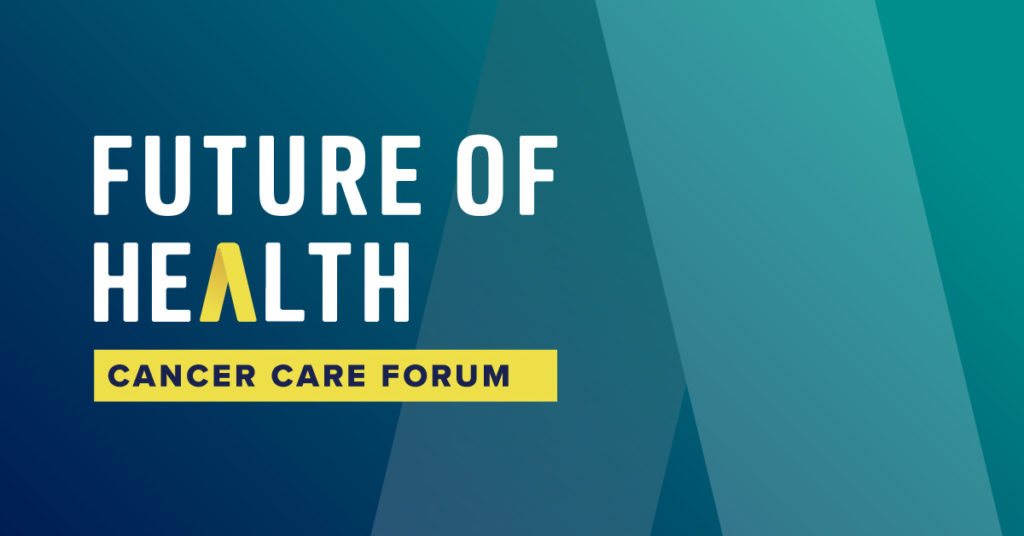Improvements across complex health-care systems are established through building a culture of innovation and a community of collaboration. With this in mind, Accelerate Okanagan, BC Cancer, Interior Health, and The University of British Columbia have joined forces to host an annual Future of Health Forum for health researchers, clinicians, innovators, entrepreneurs, and members of the public to connect and exchange ideas.
Top talent from across the country will take the stage at the Innovation Centre in Kelowna on October 18 to explore the current state of cancer care in BC and the ground-breaking research that is shaping the future of health in our province.
This forum was designed to foster connection and provide a platform for the exchange of ideas around research and innovations in cancer care. The schedule of events follows the patient journey from preventing and detecting the disease through to diagnosis and treatment to finding ways to support survivorship and a patients quality of life.
Before you hear them speak, explore the lineup of experts we will be presenting on the preventative and pre-diagnostic stage of the cancer journey. This incredible group of healthcare professionals have spent their careers investigating and identifying patterns in how our environment and culture can impact our health. Through revolutionary approaches in data-driven research to population screenings on an unprecedented scale, these speakers are working to build a future where new treatment and preventative techniques can be available nation-wide.
TRACK 1 | Prevention, Early Detection and Indigenous Cancer Control
Dr. John Spinelli
VICE PRESIDENT, POPULATION ONCOLOGY, BC CANCER
Dr. Spinelli is a unique asset to the BC Cancer Agency as he received his training in mathematics and statistics, not medicine or sciences. However, in this capacity, he was able to develop a new methodology to better evaluate cancer risk in epidemiological studies. John created a new research area in the BC Cancer Agency that looked at the interaction of environmental exposure with genetic susceptibility. This new research program is known as GENIC — Gene-ENvironment Interactions in Cancer.
Dr. Spinelli was the principal investigator for the BC Generations Project which assembled a cohort of nearly 30,000 British Columbians. Something never attempted previously in BC. Over the next 25 years, these participants will help demonstrate the gene-environment implications in cancer and other chronic diseases. This research will be combined with similar research projects across Canada, culminating in the Canadian Partnership for Tomorrow. An initiative aimed at investigating causes of many chronic diseases, identification of new early disease detection biomarkers, and markers of carcinogenic exposure.
Dr. Colin Mar
MEDICAL DIRECTOR, SCREENING MAMMOGRAPHY PROGRAM, BC CANCER
Dr. Mar was instrumental in developing an organized, provincial breast cancer-screening program, a first for Canada. In another first for the country, Mar helped open the doors to sharing breast density information with women who get screened, allowing women to better understand their breast cancer risk and how best to address it.
One of Dr. Mar’s current initiatives focuses on greater awareness around the value of receiving regular mammograms. Colin, along with his colleagues, published a paper in the BC Medical Journal postulating that both “population-based screening and treatment advances have improved breast cancer outcomes… Mammography remains the most scientifically validated screening test to reduce breast cancer mortality.”
Dr. Darren Brenner
ASSISTANT PROFESSOR, UNIVERSITY OF CALGARY
Dr. Brenner is a genetic and molecular epidemiologist interested in how lifestyle and environment impact the genome and epigenome impact on cancer risk. Brenner is currently the co-principal investigator of the Canadian Population Attributable Risk of Cancer (ComPARe) project, an ambitious look into the current and future burden of cancer in Canada and how they could be prevented. Brenner hopes ComPARe will provide an easy-to-understand map for individuals, legislators, and medical professionals. Allowing them to make decisions that will help prevent cancer even earlier.
Dr. Brenner has also begun work on a new study that looks to quantify the cost difference in cancer prevention and treatment.
TRACK 2 | Advances in Cancer Detection
Dr. Scott Bratman
ASSISTANT PROFESSOR, UNIVERSITY OF TORONTO
Between his work as a Scientist at Princess Margaret Cancer Centre and being the Assistant Professor of Radiation Oncology and Medical Biophysics at the University of Toronto, Dr. Scott Bratman’s primary research focus has been on improving outcomes for patients with head and neck cancer by developing and validating blood-based biomarkers for detecting and monitoring the presence of cancer.
Scott has noted that, despite enduring significant toxicities, patients often do not see positive results. As such, he is eager to see how his research into circulating tumour-derived DNA (ctDNA) and other biomarkers can be used to improve these experiences by distinguishing patients that could benefit from treatment intensification from those that could be cured with less toxic therapy.
Dr. Isaac Li
ASSISTANT PROFESSOR, UNIVERSITY OF BRITISH COLUMBIA OKANAGAN
Dr. Li’s research focus is on the biomechanics of leukocyte adhesion, an important process to the human immune system; however, at the University of British Columbia, Li has assembled a team to research single-molecule mechanobiology and cancer screening. Together, they are developing techniques and tools that enable us to understand the behaviour of cells from multiple perspectives simultaneously in order to correlate molecular to cellular behaviour with spatial, temporal and functional resolutions. They are doing this by creating new Single-molecule fluorescence (smFRET), single-molecule force spectroscopy (SMFS) and single-cell techniques.
Dr. Li and his team have also taken to creating their own specially designed labware in-house using their affectionately named 3D printer, Lulzbot.
Mr. Daniel Louie
GRADUATE RESEARCH ASSISTANT AND ENGINEER, UNIVERSITY OF BRITISH COLUMBIA
Daniel has designed and constructed a simple, compact laser probe that can distinguish between harmless moles and cancerous ones – in a matter of seconds. Because cancer cells are denser, larger and more irregularly shaped than normal cells, Louie can rely on the principle that light waves change as they pass through objects.
“We have so few dermatologists relative to the growing number of skin cancers that are occurring,” said Tim Lee, an associate professor of skin science and dermatology at UBC and a senior scientist at both BC Cancer and the Vancouver Coastal Health Research Institute, who supervised the work. “If we can develop a device that can be integrated easily into other parts of the health care system, we can simplify the screening process and potentially save hundreds if not thousands of lives.”
Dr. Vesna Sossi
ADJUNCT PROFESSOR, UNIVERSITY OF BRITISH COLUMBIA
Dr. Sossi’s research interests span algorithm and instrumentation development as well as multi-modal imaging analysis. Novel areas of her research are further exploitations of the PET/MRI synergies to develop new markers for brain energetics and interactions between hemodynamic and metabolic networks.
By the time symptoms of a brain illness manifest, diseases are often fairly advanced and it may be too late for effective treatment. By integrating research and clinical expertise in neurology, dementia, mood disorders, addiction, aging and neuroimaging, Sossi is looking to fundamentally improve on how we detect and manage these brain illnesses.
She has been awarded CFI funds to establish a multi-modal hybrid PET/MRI imaging Suite in the UBC Djavad Mowafaghian Centre for Brain Health.
Innovations and breakthroughs in complex health care systems occur when people and organizations work together. If you’re passionate about fueling innovation in healthcare, save yourself a seat and join us in building a better tomorrow.






